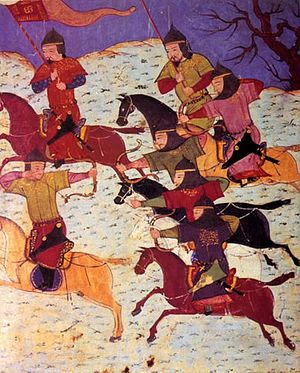The recent spectacular success of the Islamic State (IS) has raised eyebrows. These is considerable speculation as to how a small group of 6,000 to 10,000 fighters gained the upper-hand against the Iraqi national army and the Kurdish Peshmerga, both of which are better armed and more numerous than the Islamic State. Theories range from Kurdish complacency, to popular Sunni support for the Islamic State to the Islamic State’s capture of advanced American weaponry in Mosul.
The Islamic State is not the only example of a small militant group that has performed better than expected against larger enemies. Modern and near-modern examples range from the Taliban in Pakistan and Afghanistan, to fighters in Syria and Libya to Mao Zedong’s guerillas and the Vietcong. However, if we look back further in history, we find that an amazingly large number of states have been defeated by the militant or tribal sort of force that IS represents. Various Chinese dynasties, the Roman Empire, and the last pre-Islamic Persian Empire were all defeated by small, loosely organized forces. These examples seem to be part of a fairly widespread phenomenon.
To understand this phenomenon, we need to turn back to the 14th century Arab historian Ibn Khaldun, who observed the frequency of smaller, poorer groups defeating larger, better organized states. Khaldun posited that the cause of this phenomenon was a concept he termed asabiyyah. According to Khaldun, groups on the margins of society including tribes and today’s militants possess a strong sense of asabiyyah, which translates loosely as “group feeling.” Groups possessing strong asabiyyah have a strong sense of cohesion and solidarity and the individuals who made up these societies feel tightly bound to the group’s goals. On the other hand, groups that become more civilized and wealthy have a weaker sense of asabiyyah and become more lax and less coordinated because of the growth of wealth and individualism.
Thus, groups with a strong sense of solidarity and purpose frequently take their societies to great heights, but upon doing so, loose the cohesion and ability to maintain their power. As a result, they are frequently overwhelmed by newer groups possessing their original characteristics. These newer groups often see an opportunity to engage in a level of violence to achieve their goals unmatched by more established states. This explains why well-established, rich countries often feel overwhelmed in confronting small, militant groups despite the resources they have in doing so. Imagine how difficult it is then for weaker states with almost no sense of nationhood to confront militants and rebels.
Many historians are wary of such grand theories but asabiyyah can explain many historical and contemporary events, such as why the Islamic State, with fewer fighters but a great sense of purpose, defeated the demoralized Iraqi state army. It might also explain why Shia militias, who possess a similar sense of asabiyyah as the Islamic State might fare better against IS than the Iraqi army. Likewise, the performance of the Syrian national army in the Syrian civil war improved profoundly as it became consolidated around an Alawite core and forged together into a cohesive social unit by years of battle. In Pakistan, tribal forces also have a strong sense of group solidarity compared to the state. This theory also manages to explain how Germanic tribes with only thousands of warriors managed to pick apart the Roman Empire.
Of course, such views do not necessitate a deterministic view of history. It is still entirely possible for stronger, more established states to defeat smaller groups with the right combination of strategy, resources, and willpower, and indeed this has also occurred fairly often. However, the notion of asabiyyah explains why smaller, weaker groups win more often than it seems they should.
In addition to explaining why strong states often do so poorly against rebels and militias, there is a greater lesson to be drawn from all this. This lesson is that even the strongest states and civilizations will rust with time and will fall just as surely as they rose. This cyclical notion of history, which implies the repetition of certain trends due to human nature and the nature of states, is familiar to Asians— it features prominently in Chinese dynastic histories and in the Hindu notion of time for example. The nation-state seems to be under siege globally today and with it the idea that liberal democracy will necessarily triumph. Rebellions, ethnic nationalism, and state collapse are the rule in many parts of the world, including large parts of Asia, the Middle East, and Africa. This trend ranges from the externally mediated assault on Ukraine to the possible secession of Scotland to the creation of the Islamic State at the heart of the Middle East. The fact that all nations and civilizations rise and fall is something that everyone ought to remember, especially those who believe that the “End of History” has arrived.

































